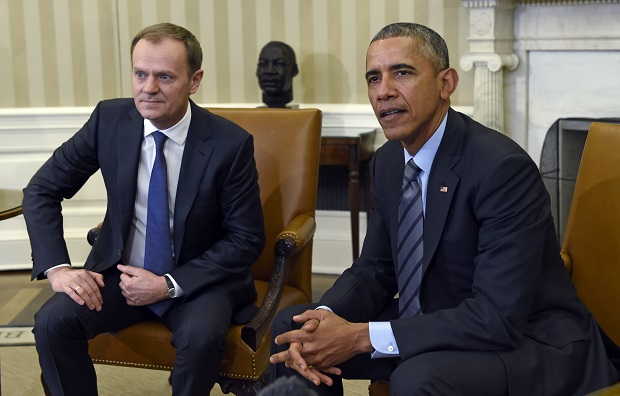Obama agreed not to send arms to Ukraine –German envoy

President Barack Obama meets with European Council President Donald Tusk in the Oval Office of the White House in Washington, Monday, March 9, 2015. AP
WASHINGTON, United States — President Barack Obama agreed last month not to send lethal defensive aid to Ukraine, a top German diplomat said Monday, as lawmakers from both parties continued to press the president to shore up Ukraine’s beleaguered military in its fight against Russian-backed separatists.
The German ambassador to the U.S., Peter Wittig, said in an Associated Press interview that Obama agreed to hold off during a White House meeting in February with German Chancellor Angela Merkel. He said Obama had concurred with Merkel that it was important “to give some space for those diplomatic, political efforts that were underway.”
“The two leaders exchanged views on that issue and there was unity by them not to impose, or not to go forward with, the delivery of lethal defensive weapons at this time,” Wittig told the AP.
The Obama administration has maintained publicly that it’s still debating whether to send anti-tank weapons and other defensive arms to bolster Kiev’s ability to defend its territory and troops in eastern Ukraine. In remarks to reporters after his meeting with Merkel, Obama said that “the possibility of lethal defensive weapons is one of those options that’s being examined” but added that “a decision has not yet been made.”
READ: Kerry says Russia has lied about its activities in Ukraine
Article continues after this advertisementNearly a dozen lawmakers from both parties joined House Speaker John Boehner last week in urging Obama to supply the weapons without delay, claiming that pro-Russian separatists have only consolidated their gains since the so-called Minsk agreements that led to last month’s fragile cease-fire.
Article continues after this advertisementYet many European governments oppose such a move — especially Germany. Those U.S. allies say they fear additional arms would only fuel a military escalation and could spark a wider proxy war with Russia.
“I think we have to weigh carefully whether this would inject an additional element that could be a pretext or a trigger for counter-reaction by the Russian leadership,” Wittig said.
The White House declined to elaborate on the status of the decision. But Mark Stroh, a spokesman for the White House’s National Security Council, said the U.S. is consulting closely with European allies and continually assessing its policies to ensure they’re appropriate to achieve U.S. objectives in Ukraine.
BACK STORY: Merkel says Ukraine conflict can’t be solved by military
As the crisis in Ukraine has deepened over the last year, the Obama administration has sought to show that the U.S. and Europe are operating in lockstep, aiming to deny Russia any opportunity to exploit divisions among Western allies. The U.S. has carefully choreographed economic sanctions on Moscow with Europe while entrusting Merkel, who has perhaps the most productive relationship with Russian President Vladimir Putin, with much of the diplomatic outreach to Russia.
Yet U.S. defense leaders have laid out an array of military options the Obama administration could consider for arming Ukraine. Testifying before Congress last week, Air Force Gen. Philip Breedlove, the top NATO commander, said those options range from small arms to more sophisticated weapons that would take longer to arrive and require extensive training.
And America’s top diplomat in Europe, Assistant Secretary of State Victoria Nuland, told Congress that the U.S. was watching to see whether the Minsk agreements are implemented before determining whether to increase its security support to Ukraine. She noted that Obama and European leaders have agreed to deepen sanctions against Russia if there are further cease-fire violations.
READ: US, NATO troops parade near Russian border in Estonia
The U.S. military said Monday it plans to deploy about 3,000 American troops to Eastern Europe beginning next week, in an effort to bolster support for NATO allies worried about escalating aggression by Russia. Ukraine is not a NATO member, but other nations in the neighborhood like Estonia, Latvia and Lithuania are NATO allies.
Obama sought to highlight trans-Atlantic unity on sanctions as he discussed the Ukraine crisis Monday with European Council President Donald Tusk, the former leader of Poland.
RELATED STORIES
Rebel pageant: Ukrainian fighters trade in boots for heels
Ukraine ceasefire period begins; world holds breath